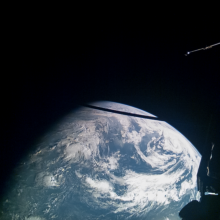At a federal research lab located at 11,135 feet (3,397 meters) of elevation, U.S. scientists measured a consequential record.
Due to its remoteness in the Pacific Ocean, the National Oceanic and Atmospheric Administration's Mauna Loa Atmospheric Baseline Observatory, located high up in Hawaii, is tasked with taking untainted, daily atmospheric measurements. On June 6, NOAA revealed evidence that the heat-trapping gas carbon dioxide is "accumulating in the atmosphere faster than ever — accelerating on a steep rise to levels far above any experienced during human existence."
This May, atmospheric CO2 levels hit 427 parts per million, or ppm, an almost 3 ppm increase since last May (annually CO2 levels peak in May, due to natural global fluctuations) and the highest peak ever recorded. What's more, combining the increases since 2022 results in the largest two-year CO2 leap on record.
The lab's continuous record paints a clear picture of how the atmosphere has changed since the late 1950s. Yet, when added to much older air samples taken from pockets of air preserved in ancient Antarctic and Greenland ice cores, along with other environmental observations, the changes over the last 150 years or so are momentous. Atmospheric CO2 is now skyrocketing.
"Not only is CO2 now at the highest level in millions of years, it is also rising faster than ever," Ralph Keeling, the director of the Scripps CO2 Program that manages the atmosphere observing program, said in a statement. "Each year achieves a higher maximum due to fossil-fuel burning, which releases pollution in the form of carbon dioxide into the atmosphere. Fossil fuel pollution just keeps building up, much like trash in a landfill."
You can imagine that this sizable change would be impactful. Yes, CO2 is considered a "trace gas" in our atmosphere — which is dominated by nitrogen and oxygen. But it's common, in our physical reality, for low concentrations of things to have outsized impacts.
"Over the past year, we’ve experienced the hottest year on record, the hottest ocean temperatures on record, and a seemingly endless string of heat waves, droughts, floods, wildfires, and storms," NOAA Administrator Rick Spinrad said in the announcement. This is part of a glaring climate change trend. "2023 was Earth’s warmest year since modern record-keeping began around 1880, and the past 10 consecutive years have been the warmest 10 on record," NASA noted.
The first graph below shows continuously rising atmospheric CO2 levels since 1958. The second puts this recent rise into perspective against the last 800,000 years.


But, crucially, civilization is not inherently doomed, climate scientists emphasize. We are not hapless; we have energy choices that can limit the worst consequences of climate change, specifically by significantly limiting CO2 going into the atmosphere.
For now, this monitoring station, and others, will continue to record the hard atmospheric facts.















